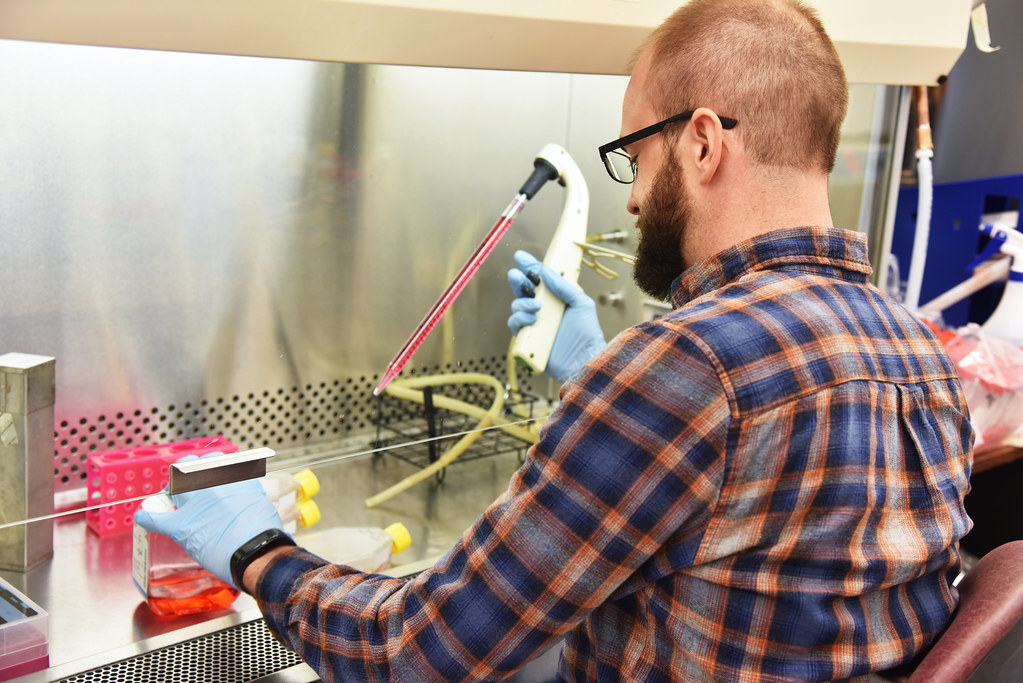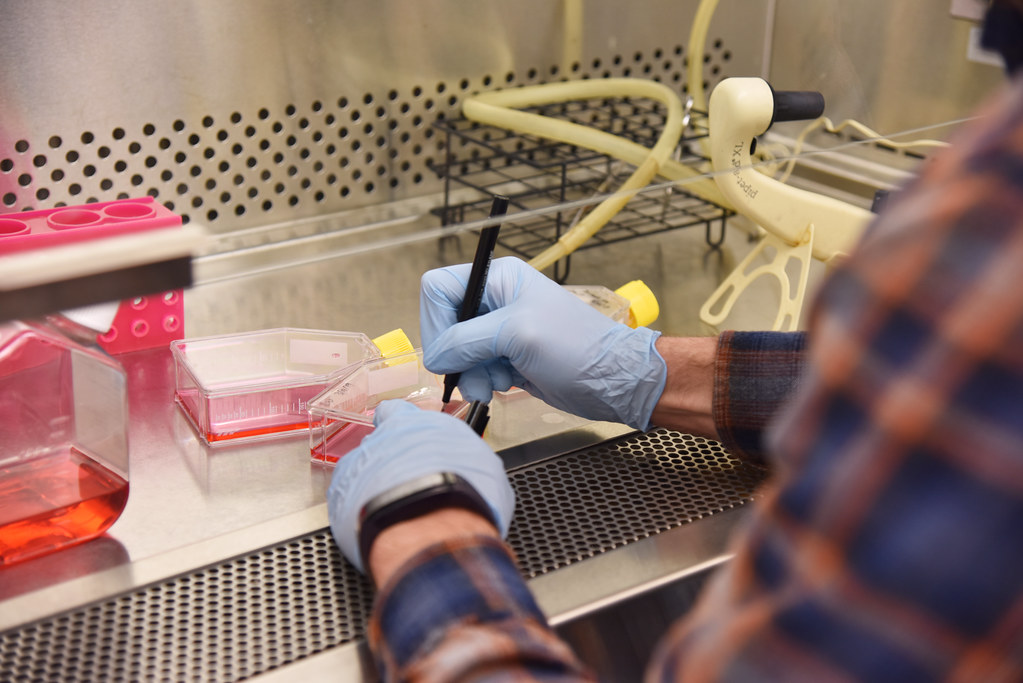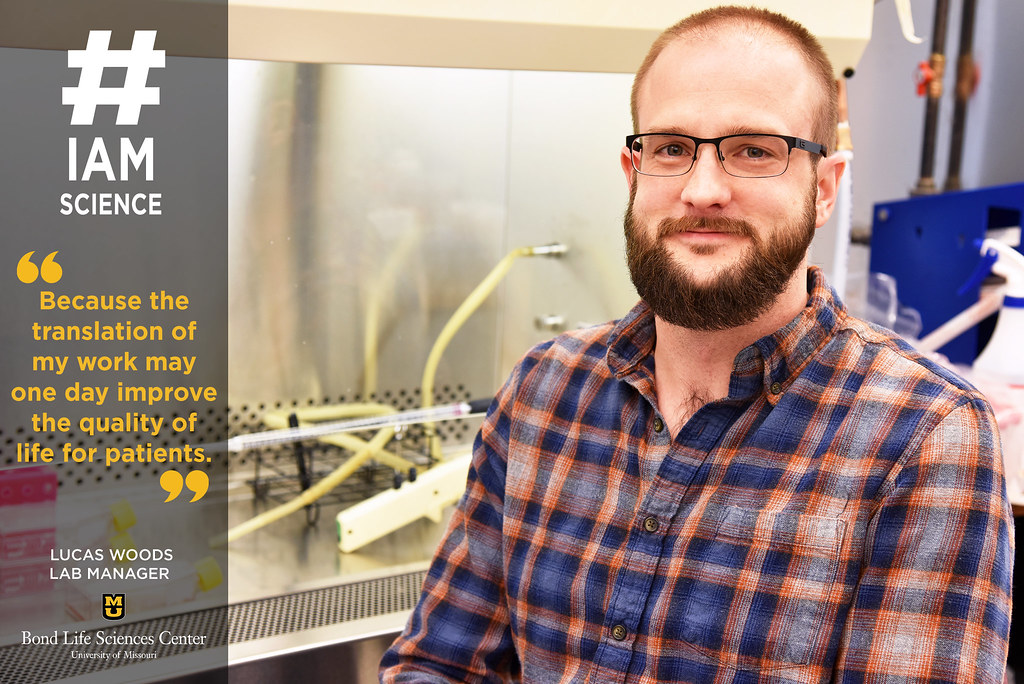By Mariah Cox | Bond LSC
Ten years ago, Lucas Woods stepped into Gary Weisman’s lab with a fresh perspective on P2 cell receptors. Now, as an experienced lab manager, Woods dives deeper into the role of these receptors in a myriad of diseases.
Woods came to the Bond Life Sciences Center after graduating from Missouri State University in Springfield with a degree in cell and molecular biology. He studied P2 receptors as a part of his undergraduate research with Dr. Richard Garrad, who completed his post-doctoral research in Weisman’s lab. Garrad recognized Woods’s interest in the area of study and recommended he continue his research with Weisman at MU.
“The initial plan was to work in Dr. Weisman’s lab for a year or two then enroll in graduate school, but after I started here, one thing led to another and here I am, 10 years later, still doing the same research I have been doing for the past 12 years,” Woods said.
Although Weisman’s lab researches the function of P2 receptors in diseases such as Alzheimer’s disease, autoimmune diseases and oral cancers, they are currently investigating the manipulation of P2 receptors in Sjögren’s syndrome.
Sjögren’s syndrome is an autoimmune disease primarily affecting women at later stages in life where the immune system attacks and damages the salivary and lacrimal glands, reducing the ability to produce saliva and tears. This can lead to dental caries, periodontitis, yeast and bacterial infections, digestive disorders, loss of taste and difficulty swallowing, all of which reduce the quality of life for patients. The progression of Sjögren’s syndrome can also lead to the development of lymphoma.
“Usually people don’t show up to the doctor until they notice they have dry mouth and dry eye,” Woods said. “There’s no real solution for them. There are current treatments that try to alleviate the symptoms, such as artificial saliva and tears, rather than treat the cause of the disease. The idea of this research is to make better treatments.”
Currently, Weisman’s lab is focusing on two drugs that target P2 receptors to systemically reduce the inflammation in the salivary gland and improve saliva flow. The lab uses mouse models of human Sjögren’s syndrome to test the effectiveness of these two drugs in blocking the response of P2 receptors to extracellular ATP, which can exacerbate inflammation if left unchecked.

“We were joking the other day that when people ask us what we do for a living and we say we collect mouse saliva, they don’t believe us,” Woods said.
Rather than trying to generate a specific drug for clinical use, the lab aims to establish the idea that if a safe drug is found that can block these receptors and improve the Sjögren’s-like symptoms in mice, then it may translate as a therapeutic strategy in humans.

After working with Weisman for 10 years, it’s safe to say Woods has learned a lot. But the main lesson that he has taken from his experience is that effective communication of science is key.
“Success in science is as much dependent on your ability to communicate science as your ability to do science,” Woods said. “That communication is often in the form of writing papers for publication or writing grants, but the ability to effectively communicate the work that you did and the work you are going to do is absolutely essential.”
In conjunction with his research, Woods is also taking classes toward completing a graduate degree.
“I’m in a unique position right now where I am both a research staff member in the biochemistry department and I’m a student in the department as well,” Woods said.
Woods’s interest in science sparked when he realized that it could lead to limitless discovery. The idea that he could be the first to discover something that the entire world doesn’t know about yet drives him in his research.
When not in the lab, Woods enjoys running and playing with his two kids, Audrey and Edison.
Eventually, Woods hopes to run his own lab. When asked whether he would continue his research with P2 receptors, Woods said it would be in his best interest because of his long history in the field of study.
“P2 receptors are so ubiquitous in the body, there’s no shortage of questions to ask that need answering,” Woods said.


